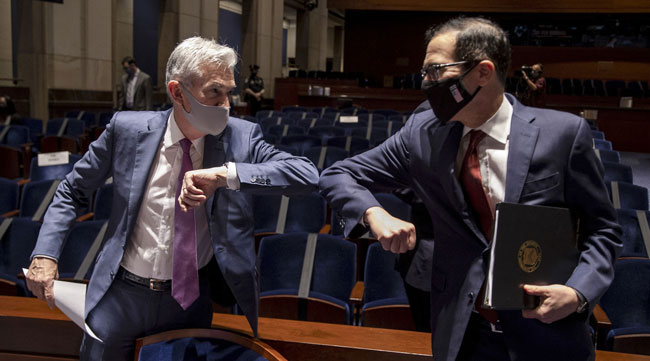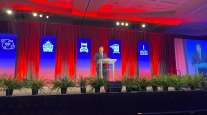US Stimulus Prospects Darken With Strains Over Supreme Court

[Ensure you have all the info you need in these unprecedented times. Subscribe now.]
The eruption of a partisan battle over replacing Supreme Court Justice Ruth Bader Ginsburg damaged already-slim prospects for another round of U.S. fiscal stimulus, threatening to undermine the recovery in the coming months.
President Donald Trump’s plans to nominate a successor to Ginsburg by the end of the week and to press for a confirmation vote before the Nov. 3 election has stoked a wave of Democratic opposition.
Besides the ill-will it’s sparked between the parties, the prospect of a contentious Senate confirmation process along with the need to pass a vital stopgap spending bill by the end of this month raises the challenge for lawmakers to get a coronavirus relief package done before they’re scheduled to break for campaigning.
It further diminishes the small hopes for a potential deal that emerged the week of Sept. 14 when Trump signaled he’d back a much bigger stimulus than the administration previously supported, and called on Republican lawmakers to shift tack as well. Democratic leaders continue to insist on a $2.2 trillion plan, after cutting their offer by more than $1 trillion, but the two sides remain far apart.
Now, the focus for the White House and Senate leadership is likely to be on Trump’s push to alter the balance of the nation’s top court, with just 43 days to go until the presidential and congressional elections.
“If Democrats think they are being mistreated on the process or procedure, they will find ways to disrupt proceedings on other issues — such as the stimulus,” said Bill Hoagland, a former Senate Republican budget director. “It will make it slightly harder.”

Federal Reserve Chairman Jerome Powell and Treasury Secretary Steven Mnuchin greet each other during a hearing June 30. (Tasos Katopodis/Bloomberg News)
Powell’s Call
Still, lawmakers will likely get a fresh reminder this week that economic growth will prove weaker without renewed fiscal stimulus, with the impact of a $2 trillion March package fading fast.
Federal Reserve Chair Jerome Powell, who last week urged more spending given the level of unemployment and pressure on small businesses, appears alongside Treasury Secretary Steven Mnuchin at a House Financial Services hearing Sept. 22. Powell has subsequent hearings later in the week.
Mnuchin and White House Chief of Staff Mark Meadows, the administration’s top negotiators on the stimulus, have been at an impasse with House Speaker Nancy Pelosi and Senate Minority Leader Chuck Schumer since early August.
RELATED: Pelosi Says Stimulus May Have to Include Airlines, Restaurants
A newly weak U.S. stock market, now approaching the textbook definition of a correction, could also still play a roll in reviving stimulus prospects. The S&P 500 Index was down 1.9% as of 1:43 p.m. in New York.
Pelosi herself raised the idea that, with the potential for key rulings on health care issues at the Supreme Court, the Ginsburg replacement debate could refocus attention on the need to arrest the coronavirus pandemic. That in turn could raise the odds of a stimulus agreement, she indicated.
Public pressure could be of “such magnitude that the Republicans will finally — finally — address the coronavirus crisis, finally subscribe to a plan to crush the virus,” said Pelosi, in an appearance on ABC’s “This Week” program.

House Speaker Nancy Pelosi speaks during a television interview Sept. 18. (Sarah Silbilger/Bloomberg News)
Zach Moller, a former Democratic Senate Budget Committee staffer who is now deputy director of the Economic Program for Third Way, a centrist policy research organization, said there technically is still time to pass a stimulus package. But given the difference between the two parties and the political atmosphere, “now the chances are probably worse.”
After the election “there’s too many unknowns about outcome and lame duck to expect much of anything on COVID relief, barring a major resurgence of the virus,” Moller said.
One senior House Democratic aide said Sept. 21 an argument could be made that Republicans will want to get a package done so that it isn’t distracting from the Supreme Court fight, though he said that circumstances are too fluid right now. The House Democratic Caucus will get an update on Pelosi’s thinking during a conferencewide call Sept. 22.

Home | Video | Heroes' Photo Gallery
Saluting the men and women of the trucking industry who kept America's essential goods flowing during the coronavirus pandemic.
Heroes: Peter Lacoste | Susan Dawson | James Rogers | Reggie Barrows | Kevin Cooper | Cesar Quintana Moreno
Senate Majority Leader Mitch McConnell earlier this month put low chances on a stimulus deal, after Democrats blocked his move for a slimmed-down package of around $650 billion in assistance.
He has now committed, over Democratic objections, to begin the nominating process for Ginsburg’s successor on the Supreme Court. A spokesman for McConnell’s office had no immediate comment Sept. 21 on how that might affect stimulus talks.
“It’s clear that the Ginsburg replacement is going to be center stage,” said Ross Baker, a political scientist at Rutgers University in New Jersey. “Republicans are so dazzled by the prospect of a solidly conservative court that they will probably pay no attention” to the need for stimulus, he said.
Want more news? Listen to today's daily briefing:
Subscribe: Apple Podcasts | Spotify | Amazon Alexa | Google Assistant | More




